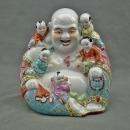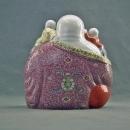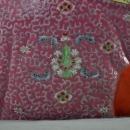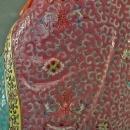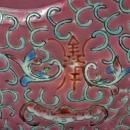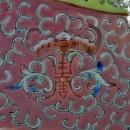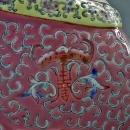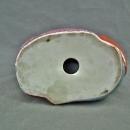Chinese Famille Rose Porcelain Figure laughing Buddha Budai With Five Happy Children








$600.00
A large, extremely well-modeled Chinese enamel polychrome porcelain figure (Famille Rose) of a laughing Buddha – Budai.
This seated deity wears a loose robe enameled with various multi-color flower heads nestled among profuse scrolling tendrils. His left hand resting on a raised knee, grasping a string of prayer beads (mala) and the other leg folded across, his right hand holding the neck of a cloth bag at his side.
Five happy children climbing on his arms and legs. One boy holds a lotus bud, the other a lotus leaf, and the third a prosperity auspicious symbol.
On the back of the robe are hand carved three longevity characters (shòu 壽), guarded by bats, which represents happiness and longevity.
The robe parted in front, revealing his large, protruding belly, a head with long pendulous earlobes, and his face with a jovial laughing expression.
The statue is decorated with precise, hand-painted, vibrant, thick enamel and highlighted with 24k gold.
The hollow figure has a round hole in the unglazed base intended to house an incense stick, and the incense smoke comes out through the Buddha’s open mouth.
Most likely 20th century, early Republic Period.
The laughing Buddha with children symbolizes happiness, contentment, prosperity, and an unbroken chain of descendants.
Budai: 布袋; is a nickname given to the ancient Chinese monk Qici: 契此) who is often identified with and venerated as Maitreya Buddha in Chan Buddhism, and one of several "uncommitted saints" that became incorporated into the Chan pantheon. He is said to have lived around the 10th century A.D in the Wuyue kingdom.
The name "Budai" literally means "cloth sack”and refers to the bag that he is conventionally depicted as carrying as he wanders aimlessly. His jolly nature, humorous personality, and eccentric lifestyle distinguish him from most Buddhist masters or figures. He is always shown smiling or laughing, hence his nickname in Chinese, the "Laughing Buddha". As Budai is traditionally depicted as overweight and having a huge stomach (a symbol of abundance or forgiveness) and many stories surrounding Budai involve his love of food and drink, he is also referred to as the "Fat Buddha", especially in the Western word.
MEASUREMENTS (approximately):
Height: 26 cm (10.24 inches).
Width at the widest point: 26 cm (10.24 inches).
CONDITION: In good condition. It shows its age and use. No breaks, repairs, or restorations, one minor hairline crack near the hole in the base.
